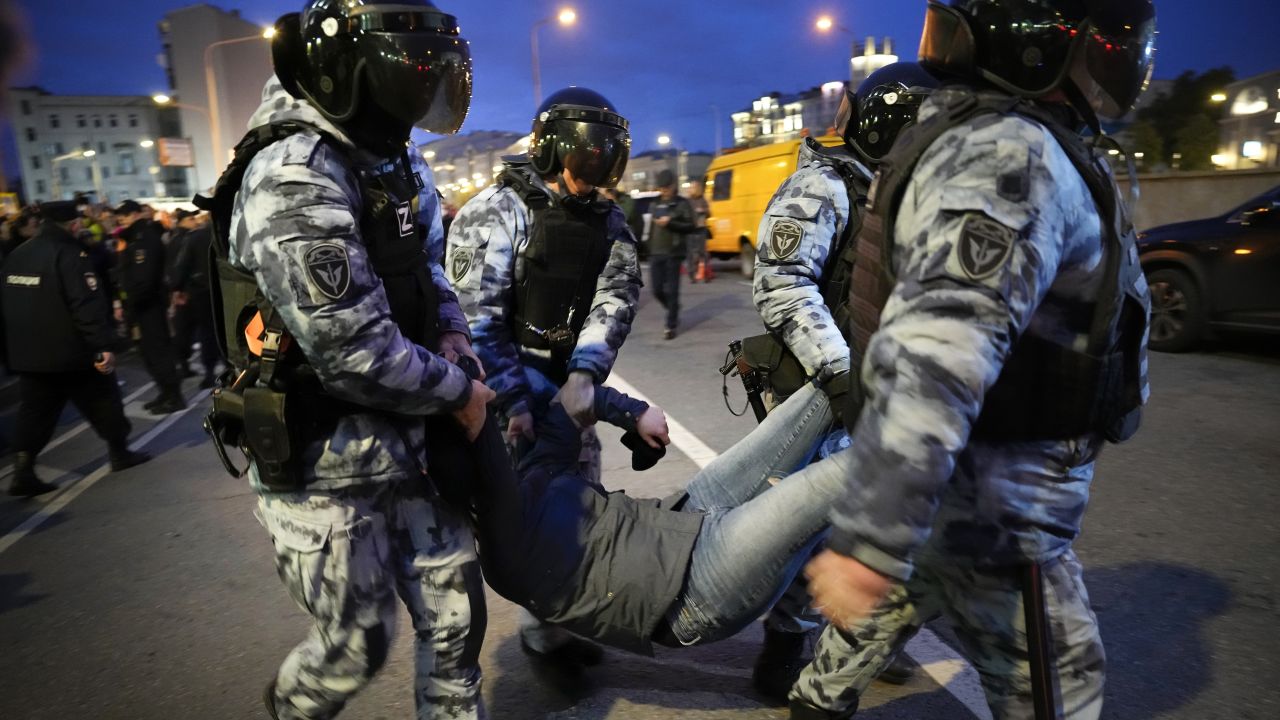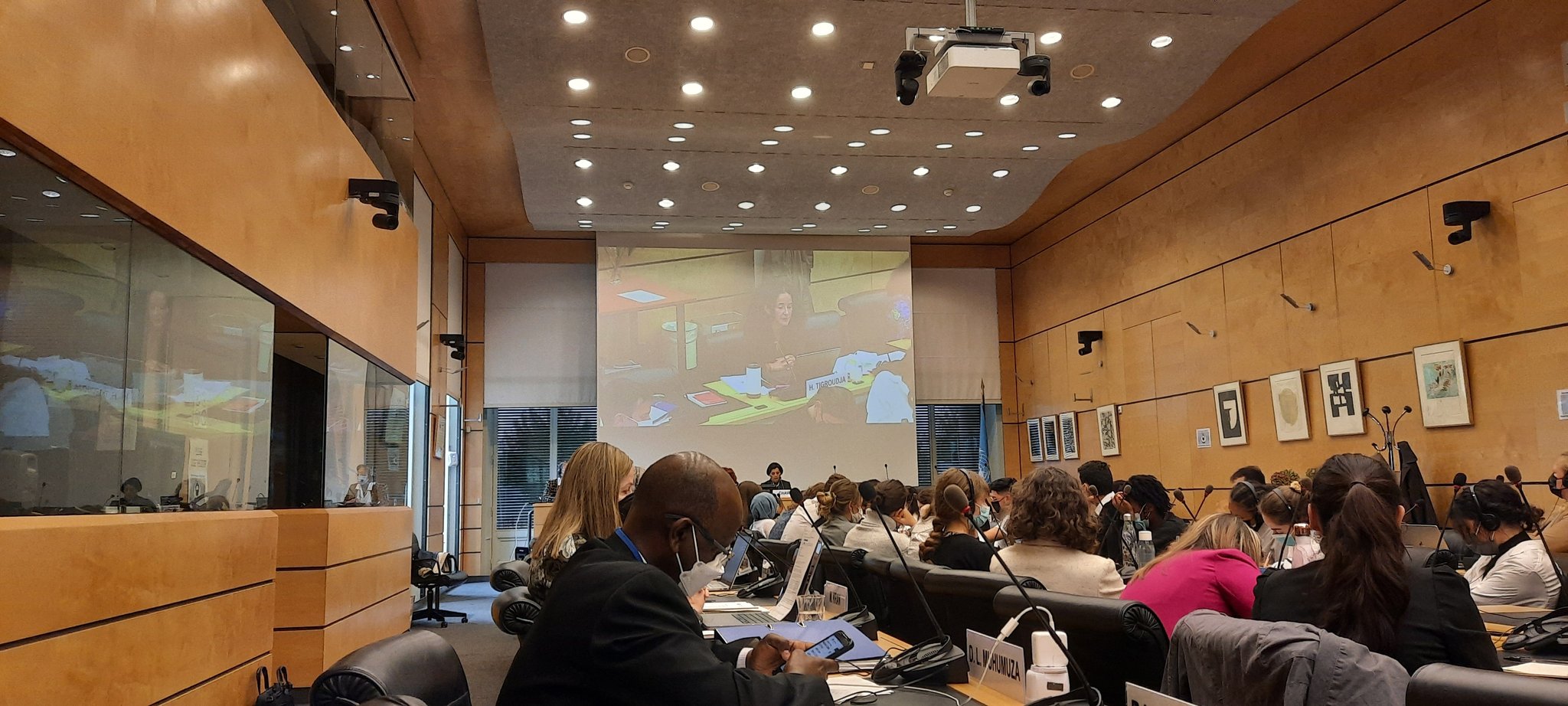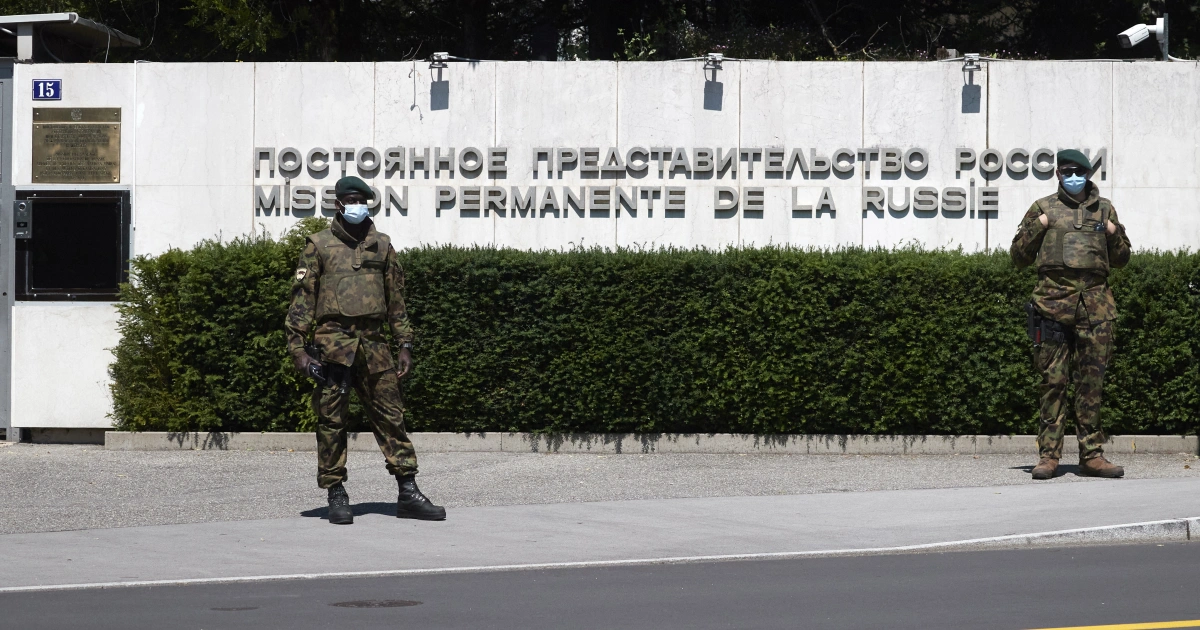Third time’s the charm: Russia finally reviewed by the Human Rights Committee without presence of the delegation
Published on 28 Oct 2022, 03:13 PM
The Russian Federation was reviewed by the Human Rights Committee on 20 October 2022
 Riot police detain a demonstrator during an anti-war protest in Moscow, Russia on September 21. Alexander Zemlianichenko/AP
Riot police detain a demonstrator during an anti-war protest in Moscow, Russia on September 21. Alexander Zemlianichenko/AP
The review of the eighth report of the Russian Federation by the Human Rights Committee was originally scheduled in March 2022, only a few weeks after the invasion in Ukraine. Russia requested the postponement of the review due to “a force majeur event, namely the closure of the airspace, making it impossible for the delegation to be present in Geneva.”
The Committee decided to reschedule the review for July 2022, but the State requested again to postpone the review to a later date, this time “in light of the emerging difficult international situation”. The Committee suggested a hybrid review, but Russia again reiterated its request “in light of the circumstances of inter alia technical and organisational nature”.
The Committee then rescheduled the review to the October session. For the third time, Russia requested the Committee to postpone the dialogue, given logistical and technical problems. It also did not accept the possibility of a hybrid review. Finally, the Committee informed the State party that the review would take place as scheduled.
After Nicaragua, Russia was the second country in a row that the Committee reviewed without the presence of a state delegation. The consideration of the report was done in accordance with art. 40 of the ICCPR and art. 68 of the Committee’s rules of procedure.
The review was based on information that was provided to the Committee by UN agencies, the National Human Rights Institution, civil society and information from the regional human rights system. Members of the Committee asked questions in the order of the List of Issues.
Application of the ICCPR in armed conflict
 Human Rights Committee reviews the report of Russia in Palais Wilson, Geneva.
Human Rights Committee reviews the report of Russia in Palais Wilson, Geneva.
The Committee stated firmly that the ICCPR applies, even in situations of armed conflict. International humanitarian law and human rights law don’t exclude each other and are complementary. The Russian state did not notify the UN of its derogation to the ICCPR in the framework of any conflict.
Extremely limited civic space
 Russian police clash with protesters during a January 23 Moscow rally in support of Alexei Navalny (Maxim Shemetov/REUTERS)
Russian police clash with protesters during a January 23 Moscow rally in support of Alexei Navalny (Maxim Shemetov/REUTERS)
The Committee noted a deterioration of the situation in the Russian Federation regarding civil and political rights. It was mainly concerned about the limited freedoms of expression, assembly and association, specifically of journalists, lawyers, bloggers, human rights defenders and political opposition leaders. It also mentioned a climate of total impunity for perpetrators that target these groups.
In that framework, the Committee stated that according to reports, independent journalism had been destroyed in Russia. There are thousands of cases of harassment and prosecution, dozens of murders, abductions and cases of torture. There is no information that any of these cases have been investigated.
Lastly, the law on assemblies has been used to arbitrarily detain thousands of anti-war protesters, which violates a number of rights in the ICCPR. Moreover, there are reports of widespread ill-treatment of detained protesters.
Watch again the dialogue with the Committee here.
Recommendations of the Human Rights Committee
Concluding Observations on Russia’s eighth periodic report were released on 3 November 2022. The State party is requested to provide, by 2025, information on the implementation of the following recommendations:
Protection of the Covenant rights in armed conflict situations
In accordance with the Committee’s General Comments No.31 (2004) on the nature of the general legal obligation imposed on States Parties to the Covenant and No. 36 (2018) on the right to life, the Committee reiterates and underscores that the Covenant applies with regard to all conduct by the State’s parties authorities or agents adversely affecting the enjoyment of the rights enshrined in the Covenant by persons subject to its jurisdiction, and urges the State party to immediately:
- (a) Take all measures necessary to fully comply with its obligations to protect the right to life, including in situations of armed conflict;
- (b) Ensure full respect of all other Covenant rights to all individuals subject to its jurisdiction, including in respect to the acts perpetrated by its agents and other affiliated actors in the areas where the State party exercises effective control; and
- (c) Guarantee thorough, effective, independent and impartial investigation of human rights violations committed by the State party’s agents against individuals subject to its jurisdiction, including in the areas where the State party exercises effective control; prosecution of perpetrators and their punishment, if convicted, in a manner commensurate with the gravity of the acts committed; and providing victims with effective remedies.
Harassment, violence and killing of opposition politicians, journalists, lawyers and human rights defenders
The State party should immediately:
- (a) End acts of harassment, intimidation, prosecution, poisoning of, and violence against and killing of opposition politicians, journalists, lawyers and human rights defenders; and
- (b) Conduct thorough and independent investigations into all allegations of harassment, intimidation, prosecution, poisoning of, violence against and killing of lawyers, journalists, human rights defenders and opposition politicians, and ensure that perpetrators are prosecuted and, if convicted, punished with commensurate sanctions and that victims are provided with effective remedies, in accordance with article 2 (3) of the Covenant.
Freedom of expression
The State party should, as a matter of urgency, take all necessary measures to guarantee the full enjoyment of freedom of expression to all individuals, taking into account the Committee’s general comment No. 34 (2011) on the freedoms of opinion and expression. In particular, the State party should:
- (a) Repeal all legislation unduly restricting freedom of expression, including articles 207.3, 275.1, 280.3, 284.2 of the Criminal Code, and refrain from adopting any further restrictions incompatible with article 19.
- (b) Promote plurality of opinions in the media and ensure that the media and media workers and their associations can operate free from undue State interference, including through repealing restrictions and blocking of online resources and platforms;
- (c) Refrain from any form of harassment of journalists, media workers and their families, and ensure the safe and full exercise of their right to freedom of expression; and
- (d) Review the detention of all journalists and media workers as to their compatibility with the Covenant and immediately release all those detained contrary to its provisions.
Here you can find all the recommendations given by the Committee in the Concluding Observations.
The follow-up report of the Russian Federation on the implementation of the recommendations is due in 2025. The next list of issues will be adopted in 2028, and the next periodic report is due in 2029.
 Riot police detain a demonstrator during an anti-war protest in Moscow, Russia on September 21. Alexander Zemlianichenko/AP
Riot police detain a demonstrator during an anti-war protest in Moscow, Russia on September 21. Alexander Zemlianichenko/AP




